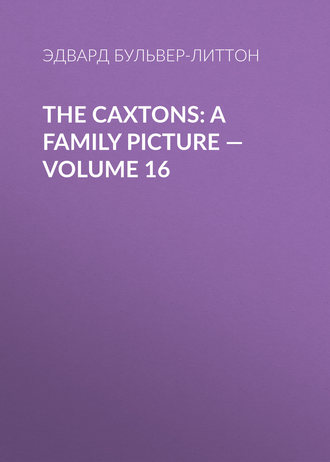
Эдвард Бульвер-Литтон
The Caxtons: A Family Picture — Volume 16
PART XVI
CHAPTER I
"Please, sir, be this note for you?" asked the waiter.
"For me,—yes; it is my name."
I did not recognize the handwriting, and yet the note was from one whose writing I had often seen. But formerly the writing was cramped, stiff, perpendicular (a feigned hand, though I guessed not it was feigned); now it was hasty, irregular, impatient, scarce a letter formed, scarce a word that seemed finished, and yet strangely legible withal, as the hand writing of a bold man almost always is. I opened the note listlessly, and read,—
"I have watched for you all the morning. I saw her go. Well! I did not throw myself under the hoofs of the horses. I write this in a public- house, not far. Will you follow the bearer, and see once again the outcast whom all the rest of the world will shun?"
Though I did not recognize the hand, there could be no doubt who was the writer.
"The boy wants to know if there's an answer," said the waiter.
I nodded, took up my hat, and left the room. A ragged boy was standing in the yard, and scarcely six words passed between us before I was following him through a narrow lane that faced the inn and terminated in a turnstile. Here the boy paused, and making me a sign to go on, went back his way whistling. I passed the turnstile, and found myself in a green field, with a row of stunted willows hanging over a narrow rill. I looked round, and saw Vivian (as I intend still to call him) half kneeling, and seemingly intent upon some object in the grass.
My eye followed his mechanically. A young unfledged bird that had left the nest too soon stood, all still and alone, on the bare short sward, its beak open as for food, its gaze fixed on us with a wistful stare. Methought there was something in the forlorn bird that softened me more to the forlorner youth, of whom it seemed a type.
"Now," said Vivian, speaking half to himself, half to me, "did the bird fall from the nest, or leave the nest at its own wild whim? The parent does not protect it. Mind, I say not it is the parent's fault,—perhaps the fault is all with the wanderer. But, look you, though the parent is not here, the foe is,—yonder, see!"
And the young man pointed to a large brindled cat that, kept back from its prey by our unwelcome neighborhood, still remained watchful, a few paces off, stirring its tail gently backwards and forwards, and with that stealthy look in its round eyes, dulled by the sun,—half fierce, half frightened,—which belongs to its tribe when man comes between the devourer and the victim.
"I do see," said I; "but a passing footstep has saved the bird!"
"Stop!" said Vivian, laying my hand on his own, and with his old bitter smile on his lip,—"stop! Do you think it mercy to save the bird? What from; and what for? From a natural enemy,—from a short pang and a quick death? Fie! is not that better than slow starvation,—or, if you take more heed of it, than the prison-bars of a cage? You cannot restore the nest, you cannot recall the parent. Be wiser in your mercy,—leave the bird to its gentlest fate."
I looked hard on Vivian: the lip had lost the bitter smile. He rose and turned away. I sought to take up the poor bird; but it did not know its friends, and ran from me, chirping piteously,—ran towards the very jaws of the grim enemy. I was only just in time to scare away the beast, which sprang up a tree and glared down through the hanging boughs. Then I followed the bird, and as I followed, I heard, not knowing at first whence the sound came, a short, quick, tremulous note. Was it near, was it far? From the earth, in the sky? Poor parent bird, like parent-love, it seemed now far and now near; now on earth, now in sky!
And at last, quick and sudden, as if born of the space, lo, the little wings hovered over me!
The young bird halted, and I also.
"Come," said I, "ye have found each other at last,—settle it between you!"
I went back to the outcast.
CHAPTER II
Pisistratus.—"How came you to know we had stayed in the town?"
Vivian.—"Do you think I could remain where you left me? I wandered out, wandered hither. Passing at dawn through yon streets, I saw the hostlers loitering by the gates of the yard, overheard them talk, and so knew you were all at the inn,—all!" He sighed heavily.
Pisistratus.—"Your poor father is very ill. Oh, cousin, how could you fling from you so much love?"
Vivian.—"Love! his! my father's!"
Pisistratus.—"Do you really not believe, then, that your father loved you?"
Vivian.—"If I had believed it, I had never left him. All the gold of the Indies had never bribed me to leave my mother."
Pisistratus.—"This is indeed a strange misconception of yours. If we can remove it, all may be well yet. Need there now be any secrets between us? [persuasively]. Sit down, and tell me all, cousin."
After some hesitation, Vivian complied; and by the clearing of his brow and the very tone of his voice I felt sure that he was no longer seeking to disguise the truth. But as I afterwards learned the father's tale as well as now the son's, so, instead of repeating Vivian's words, which— not by design, but by the twist of a mind habitually wrong—distorted the facts, I will state what appears to me the real case, as between the parties so unhappily opposed. Reader, pardon me if the recital be tedious; and if thou thinkest that I bear not hard enough on the erring hero of the story, remember that he who recites, judges as Austin's son must judge of Roland's.
CHAPTER III
Vivian.
At The Entrance of Life Sits—The Mother.
It was during the war in Spain that a severe wound, and the fever which ensued, detained Roland at the house of a Spanish widow. His hostess had once been rich; but her fortune had been ruined in the general calamities of the country. She had an only daughter, who assisted to nurse and tend the wounded Englishman; and when the time approached for Roland's departure, the frank grief of the young Ramouna betrayed the impression that the guest had made upon her affections. Much of gratitude, and something, it might be, of an exquisite sense of honor, aided, in Roland's breast, the charm naturally produced by the beauty of his young nurse, and the knightly compassion he felt for her ruined fortunes and desolate condition.
In one of those hasty impulses common to a generous nature—and which too often fatally vindicate the rank of Prudence amidst the tutelary Powers of Life—Roland committed the error of marriage with a girl of whose connections he knew nothing, and of whose nature little more than its warm, spontaneous susceptibility. In a few days subsequent to these rash nuptials, Roland rejoined the march of the army; nor was he able to return to Spain till after the crowning victory of Waterloo.
Maimed by the loss of a limb, and with the scars of many a noble wound still fresh, Roland then hastened to a home, the dreams of which had soothed the bed of pain, and now replaced the earlier visions of renown. During his absence a son had been born to him,—a son whom he might rear to take the place he had left in his country's service; to renew, in some future fields, a career that had failed the romance of his own antique and chivalrous ambition. As soon as that news had reached him his care had been to provide an English nurse for the infant, so that with the first sounds of the mother's endearments, the child might yet hear a voice from the father's land. A female relation of Bolt had settled in Spain, and was induced to undertake this duty. Natural as this appointment was to a man so devotedly English, it displeased his wild and passionate Ramouna. She had that mother's jealousy, strongest in minds uneducated; she had also that peculiar pride which belongs to her country-people of every rank and condition: the jealousy and the pride were both wounded by the sight of the English nurse at the child's cradle.
That Roland on regaining his Spanish hearth should be disappointed in his expectations of the happiness awaiting him there, was the inevitable condition of such a marriage, since, not the less for his military bluntness, Roland had that refinement of feeling, perhaps over- fastidious, which belongs to all natures essentially poetic; and as the first illusions of love died away, there could have been little indeed congenial to his stately temper in one divided from him by an utter absence of education and by the strong, but nameless, distinctions of national views and manners. The disappointment probably, however, went deeper than that which usually attends an ill-assorted union; for instead of bringing his wife to his old Tower (an expatriation which she would doubtless have resisted to the utmost), he accepted, maimed as he was, not very long after his return to Spain, the offer of a military post under Ferdinand. The Cavalier doctrines and intense loyalty of Roland attached him, without reflection, to the service of a throne which the English arms had contributed to establish; while the extreme unpopularity of the Constitutional Party in Spain, and the stigma of irreligion fixed to it by the priests, aided to foster Roland's belief that he was supporting a beloved king against the professors of those revolutionary and Jacobinical doctrines which to him were the very atheism of politics. The experience of a few years in the service of a bigot so contemptible as Ferdinand, whose highest object of patriotism was the restoration of the Inquisition, added another disappointment to those which had already embittered the life of a man who had seen in the grand hero of Cervantes no follies to satirize, but high virtues to imitate. Poor Quixote himself,—he came mournfully back to his La Mancha with no other reward for his knight-errantry than a decoration, which he disdained to place beside his simple Waterloo medal, and a grade for which he would have blushed to resign his more modest, but more honorable, English dignity.
But still weaving hopes, the sanguine man returned to his Penates. His child now had grown from infancy into boyhood,—the child would pass naturally into his care. Delightful occupation! At the thought, home smiled again.
Now behold the most pernicious circumstance in this ill-omened connection.
The father of Ramouna had been one of that strange and mysterious race which presents in Spain so many features distinct from the characteristics of its kindred tribes in more civilized lands. The Gitano, or gypsy of Spain, is not the mere vagrant we see on our commons and road-sides. Retaining, indeed, much of his lawless principles and predatory inclinations, he lives often in towns, exercises various callings, and not unfrequently becomes rich. A wealthy Gitano had married a Spanish woman;1 Roland's wife had been the offspring of this marriage. The Gitano had died while Ramouna was yet extremely young, and her childhood had been free from the influences of her paternal kindred. But though her mother, retaining her own religion, had brought up Ramouna in the same faith, pure from the godless creed of the Gitano, and at her husband's death had separated herself wholly from his tribe, still she had lost caste with her own kin and people. And while struggling to regain it, the fortune, which made her sole chance of success in that attempt, was swept away, so that she had remained apart and solitary, and could bring no friends to cheer the solitude of Ramouna during Roland's absence. But while my uncle was still in the service of Ferdinand, the widow died; and then the only relatives who came round Ramouna were her father's kindred. They had not ventured to claim affinity while her mother lived, and they did so now by attentions and caresses to her son. This opened to them at once Ramouna's heart and doors. Meanwhile the English nurse—who, in spite of all that could render her abode odious to her, had, from strong love to her charge, stoutly maintained her post—died, a few weeks after Ramouna's mother; and no healthful influence remained to counteract those baneful ones to which the heir of the honest old Caxtons was subject. But Roland returned home in a humor to be pleased with all things. Joyously he clasped his wife to his breast, and thought, with self-reproach, that he had forborne too little and exacted too much,—he would be wiser now. Delightedly he acknowledged the beauty, the intelligence, and manly bearing of the boy, who played with his sword-knot and ran off with his pistols as a prize.
The news of the Englishman's arrival at first kept the lawless kinsfolk from the house; but they were fond of the boy, and the boy of them, and interviews between him and these wild comrades, if stolen, were not less frequent. Gradually Roland's eyes became opened. As in habitual intercourse the boy abandoned the reserve which awe and cunning at first imposed, Roland was inexpressibly shocked at the bold principles his son affected, and at his utter incapacity even to comprehend that plain honesty and that frank honor which to the English soldier, seemed ideas innate and heaven-planted. Soon afterwards, Roland found that a system of plunder was carried on in his household, and tracked it to the connivance of the wife and the agency of his son for the benefit of lazy bravos and dissolute vagrants. A more patient man than Roland might well have been exasperated, a more wary man confounded, by this discovery. He took the natural step,—perhaps insisting on it too summarily; perhaps not allowing enough for the uncultured mind and lively passions of his wife,—he ordered her instantly to prepare to accompany him from the place, and to abandon all communication with her kindred.
A vehement refusal ensued; but Roland was not a man to give up such a point, and at length a false submission and a feigned repentance soothed his resentment and obtained his pardon. They moved several miles from the place; but where they moved, there some at least, and those the worst, of the baleful brood stealthily followed. Whatever Ramouna's earlier love for Roland had been, it had evidently long ceased, in the thorough want of sympathy between them, and in that absence which, if it renews a strong affection, destroys an affection already weakened. But the mother and son adored each other with all the strength of their strong, wild natures. Even under ordinary circumstances the father's influence over a boy yet in childhood is exerted in vain if the mother lend herself to baffle it. And in this miserable position, what chance had the blunt, stern, honest Poland (separated from his son during the most ductile years of infancy) against the ascendancy of a mother who humored all the faults and gratified all the wishes of her darling?
In his despair, Roland let fall the threat that if thus thwarted, it would become his duty to withdraw his son from the mother. This threat instantly hardened both hearts against him. The wife represented Roland to the boy as a tyrant, as an enemy, as one who had destroyed all the happiness they had before enjoyed in each other, as one whose severity showed that he hated his own child; and the boy believed her. In his own house a firm union was formed against Roland, and protected by the cunning which is the force of the weak against the strong.







